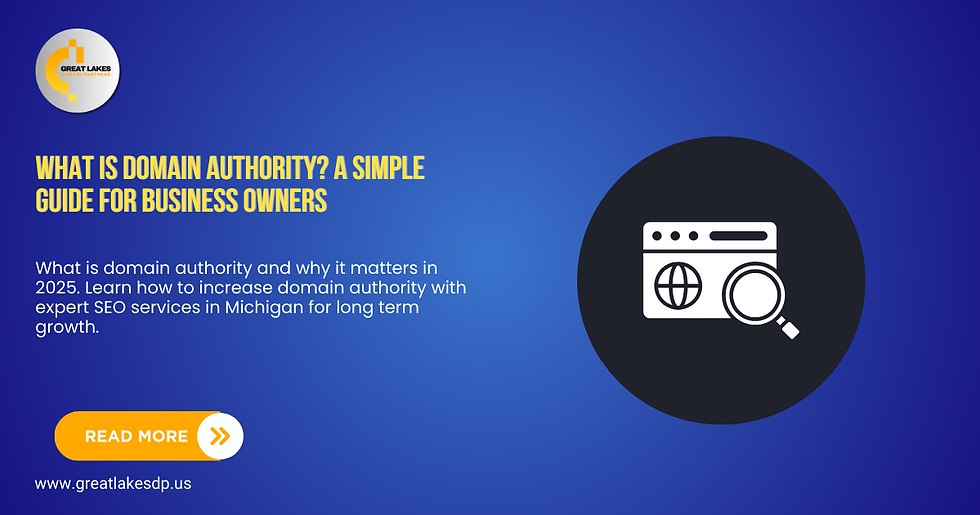Fact vs. Myth: What Really Impacts Your Google Page Rankings?
- Great Lakes
- Aug 6, 2025
- 3 min read

When it comes to Google page rankings, the digital world is flooded with tips, tricks, and quick-fix promises. Some are grounded in fact, others are outdated myths that can actually harm your SEO. If you want to improve your search visibility in 2025, you need to separate what works from what’s just noise. Here’s your fact-checked guide.
Myth 1: Keyword Stuffing Still Works
Fact: In 2025, Google’s algorithm is more focused on semantic search and user intent than ever. Overusing your keywords can hurt rankings, as Google prioritizes natural, valuable content. Aim for strategic placement of your primary and secondary keywords while keeping the content engaging.
Myth 2: Backlinks Are All That Matter
Fact: While backlinks remain one of the most important SEO ranking factors, quality beats quantity. A handful of relevant, authoritative links will outperform hundreds of low-quality ones. Google now uses advanced AI models to analyze backlink trustworthiness.
Myth 3: Technical SEO Is Optional
Fact: Site speed, mobile responsiveness, and clean coding are critical factors affecting Google rankings. With Core Web Vitals now influencing search results directly, technical SEO has shifted from being optional to non-negotiable.
Myth 4: Content Length Guarantees Better Ranking
Fact: Google rewards comprehensive, relevant content, but that doesn’t mean longer is always better. In 2025, AI-assisted search focuses on concise answers for featured snippets, making structure, clarity, and topical coverage more important than word count alone.
Proven Strategies to Improve Google Page Rankings
1. Focus on E-E-A-T
Google values Experience, Expertise, Authoritativeness, and Trustworthiness. Show industry authority through case studies, original research, and expert authorship.
2. Optimize for Voice & AI Search
Voice queries are expected to make up over 50% of searches in 2025. Tailor your content to conversational queries and question-based headings.
3. Prioritize Core Web Vitals
Aim for a Largest Contentful Paint (LCP) under 2.5 seconds, a First Input Delay (FID) below 100 milliseconds, and a Cumulative Layout Shift (CLS) score under 0.1.
4. Local SEO for Competitive Edge
For businesses in Michigan, optimizing Google Business Profile and local citations is key. An SEO Agency in Michigan can help craft a geo-targeted content strategy that boosts both local and national rankings.
5. Continuous Content Refresh
Updating old posts with fresh statistics, images, and multimedia helps retain rankings and adapt to evolving SEO services in Michigan strategies.
Question: What actually improves Google page rankings?
Answer: High-quality content, authoritative backlinks, optimized user experience, mobile-first design, and Core Web Vitals performance are the real game changers.
Why Staying Updated Matters
Google makes thousands of algorithm updates each year, many unannounced. Businesses that adapt quickly to verified SEO ranking factors and drop outdated tactics outperform competitors in visibility and conversions.
Let’s Get Your Business to the Top of Google
If you are serious about climbing Google page rankings and want a strategy tailored to your business, Great Lakes is here to help. As a trusted SEO Agency in Michigan, we use cutting-edge tools, proven strategies, and deep market insights to boost visibility and conversions. Let our SEO services in Michigan position your business exactly where your customers are searching.
FAQs
Q1: Does social media activity affect Google page rankings?
Not directly. However, strong social engagement can drive traffic, build brand awareness, and earn backlinks that improve your SEO indirectly.
Q2: Are paid ads a ranking factor?
No, Google Ads do not directly influence organic rankings. However, they can boost visibility and clicks, leading to more traffic and potential backlinks.
Q3: How often should I update my website content for better rankings?
Aim to review and refresh content every 3–6 months, especially for high-traffic pages, to ensure accuracy and maintain competitive positioning.
Q4: Is HTTPS still important for rankings?
Yes, HTTPS remains a confirmed ranking factor as it enhances site security, user trust, and compliance with Google’s best practices.
Q5: Do images impact SEO?
Yes, optimized images with proper alt tags, compression, and relevant file names improve user experience and can drive traffic through Google Image Search.











Comments